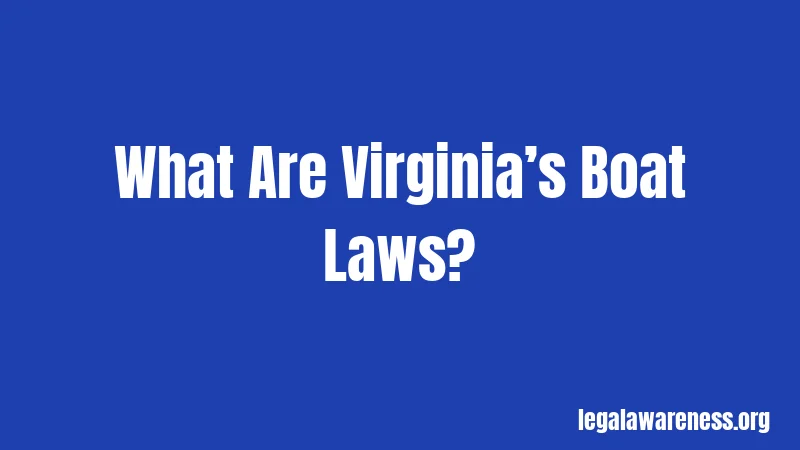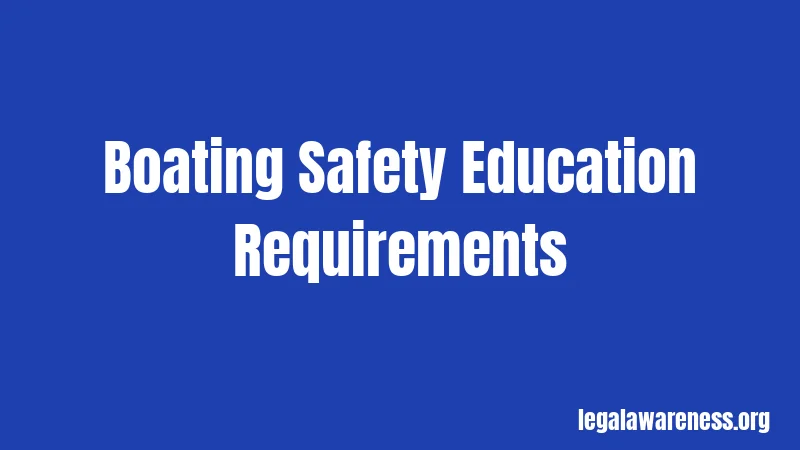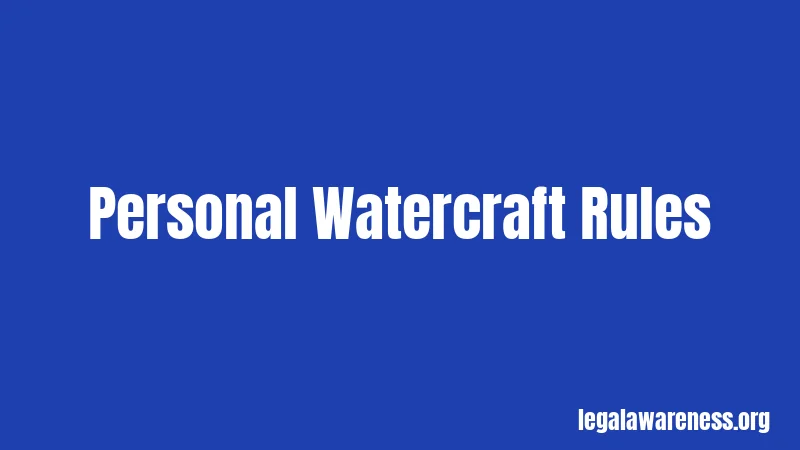Boat Laws in Virginia (2026): Rules That Could Cost You
Most people think boating is all about fun and freedom. And it is. But Virginia takes its waterway regulations seriously, and the penalties for breaking them can hit hard.
Whether you’re cruising the Chesapeake Bay or exploring Lake Anna, you need to know the rules. Let’s break down exactly what Virginia law requires from boaters in 2026.
What Are Virginia’s Boat Laws?

Virginia boat laws cover everything from registration to safety equipment to how you operate your vessel. The Virginia Department of Wildlife Resources enforces these rules. They’re designed to keep everyone on the water safe.
Think of them like traffic laws, but for boats. Break them, and you could face fines, jail time, or lose your boating privileges. Honestly, most violations are totally preventable if you just know the rules.
Do You Need to Register Your Boat in Virginia?
Here’s the deal. If your boat has a motor of any kind, you need to register it. This includes gasoline, diesel, and electric motors. Doesn’t matter if the motor is your main power source or just a backup.
Sail-powered vessels over 18 feet also need registration. Canoes, kayaks, and other paddle-powered boats? You’re good. No registration needed unless you add a motor.
Your registration lasts for three years. The cost depends on your boat’s length. Boats under 16 feet cost $32 to register. Vessels 16 to 20 feet run $40. Boats 20 to 40 feet are $56. Anything over 40 feet? That’s $72.
You’ll also pay a $10 title fee. Plus there’s a 2% watercraft sales tax on the purchase price. The max tax is $2,000, though.
Wait, it gets better. You can register online, by mail, or in person at any Virginia DMV office. The state makes it pretty straightforward.
Boating Safety Education Requirements

Okay, this one’s important. Virginia requires boating safety education for most operators. If you’re operating a motorboat with 10 horsepower or more, you need to take an approved safety course. This applies regardless of your age.
Personal watercraft operators also need the course. The minimum age to operate a PWC is 14. Operators who are 14 or 15 must carry proof of course completion with them.
No one under 14 can operate a PWC. Period. Pretty strict, right?
The safety course is good for life. Once you complete it, you’re done. Many online providers offer NASBLA-approved courses. You can also take classroom courses throughout Virginia.
The course covers navigation rules, safety equipment, and responsible operation. Most people find it helpful, even experienced boaters. You’ll get a waterproof card after completion. Keep it on your boat whenever you’re operating.
Not carrying your proof? That can result in a fine. Conservation Police officers can ask to see it anytime.
Required Safety Equipment
Every boat in Virginia needs specific safety equipment. Let’s start with life jackets. You need one Coast Guard-approved wearable life jacket for each person on board. No exceptions.
Boats 16 feet or longer also need a throwable device. This can be a ring buoy or seat cushion. Make sure it’s Coast Guard-approved.
Sound complicated? It’s actually not. Just make sure every life jacket is in good condition and properly sized. Kids under 13 must wear their life jackets while the vessel is underway on federal waters. This is federal law, enforced by the Coast Guard.
PWC operators and passengers have stricter rules. Everyone on a PWC must wear a life jacket at all times. Inflatable life jackets don’t count for PWCs. The high-impact nature of these watercraft makes traditional life jackets necessary.
Fire extinguishers are required on boats with enclosed engine compartments, fuel tanks, or living spaces. Visual distress signals are needed for boats operating in coastal waters.
Personal Watercraft Rules

PWCs have their own set of rules in Virginia. We already covered the age requirements. But there’s more.
PWCs can only operate during daylight hours. That means sunrise to sunset. No night riding allowed. If you’re caught operating after dark, you’re breaking the law.
Everyone on a PWC must wear a life jacket. No inflatable PFDs allowed. If your PWC has a lanyard-type engine cutoff switch, you must attach it to yourself, your clothing, or your life jacket.
Stay with me here. You also need to maintain “no wake” speed within 50 feet of docks, piers, boathouses, boat ramps, and people in the water. “No wake” means the slowest speed needed to maintain control and forward movement.
Reckless operation is illegal. This includes weaving through other vessels at high speed, following too closely, crossing between a tow boat and skier, or spraying people with your wake.
The penalties for reckless PWC operation? Up to one year in jail and a $2,500 fine. Plus you could lose your boating privileges for six months. These aren’t minor violations.
Boating Under the Influence Laws
This is where things get serious. Operating a boat while intoxicated is illegal in Virginia. The legal limit is 0.08% BAC, same as driving a car.
For boaters under 21, there’s a “zero tolerance” policy. Any measurable alcohol level of 0.02% or higher is illegal. Basically, don’t drink at all if you’re under 21 and operating a boat.
A first-offense BUI is a Class 1 misdemeanor. You could face up to 12 months in jail and a $2,500 fine. Your boating privileges can be suspended for up to 12 months. You might be required to complete an alcohol safety program.
Second offense? The penalties get worse. Jail time increases. Your boating license suspension can last up to three years.
If your BUI causes serious injury or death, you’re looking at felony charges. Involuntary manslaughter carries up to 10 years in prison. Aggravated involuntary manslaughter? That’s up to 20 years, with one year mandatory minimum.
Wondering if this applies to you? If you’re on Virginia waters and operating any motorized vessel, yes, it applies. The police can stop and board your boat to conduct safety checks. If they suspect impairment, they can test you.
By operating a boat in Virginia, you automatically consent to breath or blood testing. Refusing the test can result in automatic penalties, including suspension of boating privileges.
Most people don’t realize how strict these laws are. About half of all boating fatalities involve alcohol. Virginia law enforcement takes this very seriously.
Registration Number Display Rules
Once you register your boat, you’ll receive a registration number. You must display this correctly on both sides of the bow.
The numbers must be in block letters at least 3 inches tall. They need to contrast with your hull color. So white letters on a dark hull, or dark letters on a light hull.
The format looks like this: VA 1234 YZ or VA-1234-YZ. There must be a space or hyphen between the letter and number groups. Reading from left to right is required.
Your registration card must stay on the boat whenever it’s in operation. Keep it in a waterproof container. If you can’t produce it when asked by law enforcement, you could face penalties.
What Happens If You Don’t Register?
Operating an unregistered boat is illegal. You can’t use it on public waters in Virginia without proper registration.
The penalties include fines and possible confiscation of your vessel. Conservation Police officers patrol Virginia’s waterways year-round. They will check registrations.
New boats must be registered before their first use. If you bought a used boat with current registration, you can operate it for 30 days using the previous owner’s registration. You’ll need a dated bill of sale and the old registration card on board.
After 30 days? You must have your own registration. No excuses.
Accident Reporting Requirements
If you’re involved in a boating accident, Virginia law requires you to stop and render assistance. Failing to do so is a crime.
You must report accidents that result in death, disappearance, injury requiring medical treatment beyond first aid, or property damage over $2,000. Reports go to the Virginia Department of Wildlife Resources.
Accidents involving death or disappearance must be reported within 48 hours. Other reportable accidents need reporting within 10 days.
Hit-and-run boating accidents are serious crimes. If the accident causes serious injury or death and you leave, that’s a Class 6 felony. You could face up to five years in prison.
Even accidents with only property damage require you to stop. Leaving the scene is a Class 1 misdemeanor. The only exception is if the damage is under $50 to an unattended vessel.
Environmental Protection Rules
Virginia has strict environmental laws for boaters. You cannot discharge oil, fuel, sewage, or trash into state waters. Period.
Some areas are designated as no-discharge zones. In these zones, you cannot release any sewage, even treated waste. Check local regulations for these zones.
Invasive species prevention is also required. You must clean your boat and trailer when moving between water bodies. Aquatic hitchhikers can devastate ecosystems.
The penalties for environmental violations can be steep. Fines vary depending on the violation. Repeat offenders face increased penalties.
Out-of-State Boats in Virginia
Visiting Virginia with your boat? You can use your home state’s current registration for up to 90 consecutive days. After that, you need Virginia registration.
This applies if you keep the boat in Virginia for more than 90 days. Temporary visitors are fine with out-of-state registration.
Coast Guard documented vessels don’t need state registration. But you can get a Virginia registration decal if you want one.
Special Speed and Wake Restrictions
Some Virginia waters have special speed limits or wake restrictions. Lakes, rivers, and certain bays may have posted speed limits.
“No wake” zones are common near marinas, swimming areas, and residential shorelines. Violating these can result in fines.
Some localities have additional restrictions. Virginia Beach, for example, has specific regulations for PWC operation near shorelines and swimmers.
Always watch for regulatory buoys and signs. They’re there for a reason. Ignoring them can lead to citations.
Rental Boat Requirements
If you rent a boat in Virginia, the rental company has specific requirements. They must provide you with information on Virginia boating laws.
For motorboats with 10 horsepower or greater, rental companies must give you a dockside safety checklist. You’ll review and initial each item before operating the boat.
PWC rentals require instruction on Commonwealth laws, the specific watercraft’s operation, safety equipment, and accident reporting procedures.
Rental companies that skip these requirements face civil penalties up to $250. But as the renter, you’re still responsible for following all boating laws.
How Conservation Police Enforce Boat Laws
Virginia Conservation Police patrol the state’s waterways. They have full law enforcement authority on the water.
Officers can stop boats for safety checks. They can board your vessel to inspect safety equipment and registration. Cooperating with them makes everything smoother.
If you’re operating legally with proper equipment and registration, these stops are quick and painless. Most officers are friendly and appreciate boaters who follow the rules.
Violations can result in tickets, fines, or criminal charges depending on the offense. Serious violations like BUI can lead to arrest.
Commercial Vessels and Special Use Permits
Commercial vessels operating in Virginia have additional requirements. This includes charter boats, water taxis, and fishing vessels for hire. These boats must carry insurance and operators need appropriate licenses.
If you’re running a commercial operation, check with the Virginia DWR for specific requirements.
Penalties and Fines
Let’s talk money. Violations of Virginia boat laws come with real financial consequences.
Not carrying your boating safety education card? That’s a $100 civil penalty. Operating without proper registration brings fines and possible impoundment.
Reckless operation is a Class 1 misdemeanor. Up to one year in jail and $2,500 in fines. BUI carries the same penalties for a first offense.
Repeat offenses increase the penalties. And if your violation causes injury or death, you’re looking at felony charges with prison time.
The Virginia Alcohol Safety Action Program may be required for BUI convictions. Loss of boating privileges is common for serious violations.
How to Stay Compliant
Staying legal on Virginia waters is pretty straightforward. Register your boat before using it. Take the required safety course and carry proof.
Equip your boat with proper safety gear. Life jackets, fire extinguisher, sound devices, and visual distress signals as needed.
Don’t drink and boat. Seriously, just don’t. The risks aren’t worth it.
Follow posted speed limits and wake restrictions. Be respectful of other boaters and people in the water.
If you’re not sure about a rule, look it up or ask. The Virginia DWR website has comprehensive information. Conservation officers can also answer questions.
Frequently Asked Questions
Do I need a boating license in Virginia?
Virginia doesn’t issue boating “licenses” like driver’s licenses. Instead, you need proof of completing a NASBLA-approved boating safety course. This applies to anyone operating a motorboat with 10 horsepower or more, or any PWC. The course completion card serves as your credential.
How much does it cost to register a boat in Virginia?
Registration fees range from $32 to $72 depending on your boat’s length. You’ll also pay a $10 title fee and a 2% sales tax on the purchase price (capped at $2,000). So total costs vary, but expect at least $50-$100 for most boats.
Can kids operate boats in Virginia?
There’s no minimum age for operating motorboats, but the operator must have completed the required safety course. For PWCs, operators must be at least 14 years old and have completed a safety course. No one under 14 can operate a PWC under any circumstances.
What happens if I get a BUI in Virginia?
A first-offense BUI is a Class 1 misdemeanor with up to 12 months in jail and a $2,500 fine. You could lose your boating privileges for up to one year and be required to complete an alcohol safety program. Repeat offenses or BUIs causing injury bring harsher penalties.
Do I need insurance for my boat in Virginia?
Virginia doesn’t require boat insurance for recreational vessels. However, commercial vessels must carry insurance. Even though it’s not required, insurance is highly recommended to protect yourself from liability and property damage.
Final Thoughts
Virginia boat laws exist to keep everyone safe on the water. They’re not there to ruin your fun. Follow the registration requirements, complete your safety course, equip your boat properly, and operate responsibly.
Most violations are easily avoided. Register before you boat. Don’t drink and operate. Wear your life jacket. Respect speed limits and other boaters.
The Virginia waterways are beautiful and meant to be enjoyed. Do it legally, and you’ll have a great time without worrying about fines or penalties. When in doubt, check the Virginia DWR website or ask a Conservation Police officer.
Stay safe out there.
References
- Virginia Department of Wildlife Resources – Boating Laws and Regulations: https://dwr.virginia.gov/boating/boaters-guide/
- Code of Virginia – Chapter 7, Boating Laws: https://law.lis.virginia.gov/vacodefull/title29.1/chapter7/
- Virginia DWR – Boat Registration and Titling: https://dwr.virginia.gov/boating/registration/
- Virginia DWR – Boating Safety Education Requirement: https://dwr.virginia.gov/boating/education/boating-safety-education-requirement/
- Virginia DWR – Personal Watercraft Regulations: https://dwr.virginia.gov/pwc-regulations/
